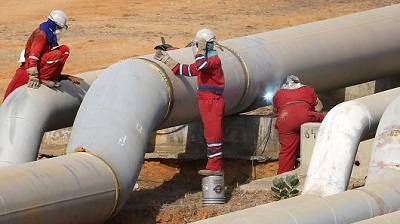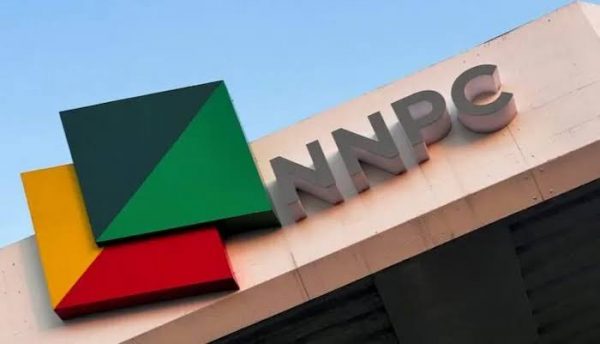OIL & GAS
Scientists Reduce Corrosion In Oil Pipelines With Local Biocides
Scientists have effectively reduced corrosion in crude oil and petroleum pipelines using natural and non-toxic biocides to replace imported and toxic versions.
A biocide is defined in the European legislation as a chemical substance or microorganism intended to destroy, deter, render harmless, or exert a controlling effect on any harmful organism by chemical or biological means.
Until now, it is estimated that the Nigerian oil and gas industry loses up to $765 million yearly to corrosion of oil pipelines.
Professor of Petroleum Microbiology and Microbial Biotechnology, Federal University, Ndufu-Alike, Ikwo (FUNAI) Ebonyi State, Dr. Chuma Conlette Okoro, and his team of researchers published their latest work in the journal Corrosion Science.
The other researchers include: Olusegun Samuel of the Department of Marine Biology, University of Lagos; and Johnson Linc of the School of Life Sciences, University of KwaZulu Natal Westville campus, Durban, South Africa.
The researchers led by Okoro investigated the effects of some biocides on methanogens associated with pipeline corrosions.
They wrote: “The crude oil transporting pipeline showed higher methane production (60 per cent) and corrosion rates (42 per cent) than the water transporting pipeline. Higher concentrations of biocide (0.7 per cent Tetrakis-hydroxymethyl phosphonium sulfate) and 40 mM nitrite were required for both pipelines to sufficiently inhibit methanogenesis and corrosion rates. A sudden increase in corrosion rate happened only in samples that produced higher than 1.5 mmole of methane.
Pyrosequencing surveys show dominance of acetotrophic, hydrogenotrophic and methylotrophic methanogens in the samples. The methane productions and corrosion rates were strongly correlated under all the conditions.”
Methanogenesis or biomethanation is the formation of methane by microbes known as methanogens.
Pyrosequencing is a method of DNA sequencing (determining the order of nucleotides in DNA) based on the “sequencing by synthesis” principle, in which the sequencing is performed by detecting the nucleotide incorporated by a DNA polymerase.
Deoxy ribonucleic Acid (DNA) is the genetic material. Nucleotides are the building blocks of nucleic acids.
The researchers concluded: “The results also show that SRBs did not play an active role in the bio-corrosion episode because their activity and population were low in both samples and pyrosequenced data also revealed near absence of SRBs in both samples. THPS at higher concentrations of about 700 mg/L and above was effective in drastically reducing methane production rate and corrosion rates of samples probably as a result of its weak penetrability into biofilms. It is however expected that combination treatments with either NaCl or Nitrite and THPS may improve the efficiency of THPS at lower concentrations and make it cost effective.
One has to be aware that the microbes exposed to environment in real pipes are largely different from those under the laboratory conditions. In addition, the inhibitor tolerance of microbes and impact of inhibitors on corrosion rates over long-term is largely unknown. Therefore, long term studies in the field are needed to confirm the findings in this study.”
This work was supported by Grants from the Nigerian Petroleum Technology Development Fund (PTDF). The pilot stages of this research, which PTDF is expected to provide funding in 2018 will finally confirm this assertion.
The DNA analysis and pyrosequencing was carried out with Grants from Prof. Gerrit Voordouw, University of Calgary, Alberta Canada.
Okoro had in 2014 reported the development the most cost effective and efficient technology that can be used to diagnose and remediate problems associated with corrosion and souring in oil and gas industries.
Okoro told The Guardian that the advanced technology can save up to 75 per cent of the cost used currently in managing corrosion and souring related problems in the Nigerian oil and gas industry and this translates to about N13.4 billion annually.
Okoro said because of the danger posed by climatic changes, access to clean water by year 2020 will pose some serious challenge and this have necessitated the need for aggressive research on ground water quality.
The professor of microbiology said his future research focus is on “Bioremediation of ground water sources from Ebonyi state polluted with heavy metals and toxic organics.”
“We are currently sourcing for grants from United States Agency for International Development (USAID) and British Department for International Development (DFID) and have already secured collaboration with two United States Geological Survey (USGS) scientists. We are also integrating some graduate students in this research,” he said.
Indeed, with these research breakthroughs made possible by the PTDF research grants, the FUNAI governing council on the October 12, 2017, ratified the appointment of Okoro as a full professor effective from October 1, 2016 in the area of Petroleum Microbiology and Environmental Biotechnology.
Okoro had his first degree in Microbiology from the University of Nigeria Nsukka (UNN) and Master of Science (MSc) and Ph.D. from the University of Lagos (UNILAG).
Okoro told newsmen “Part of my Ph.D. research was sponsored by Chevron between 1996 and 1997 and I did most of my Ph.D laboratory work under the United Nations Educational, Scientific and Cultural Organization (UNESCO) sponsorship at the University of Tel-Aviv, Israel under the supervision of Prof. Eugene Rosenberg. Most of my postdoctoral research was done at the University of Calgary, Canada with Prof. Gerrit Voordouw.
“I can confidently say that the PTDF research grant which I won in 2012 contributed significantly to my elevation to a full professorial chair. I was a Senior lecturer in 2012 when I won the oil and gas PTDF research grant. Publications from the grant elevated me to the rank of an associate Professor in 2013 and finally to a full Professor in 2016.
“I have to my credit over 50 scientific publications and 30 out of which are from Thomson Reuter’s impact journals and 15 are from PTDF projects. Having about 30 Thomson Reuter’s impact publications makes me a world class professor.
“Outputs from My PTDF research recorded very high impact both in the Nigerian oil and gas industry and the global oil and gas environment.”
Copyright MMS Plus.
All rights reserved. This material, and other digital content on this website, may not be reproduced, published, broadcast, rewritten or redistributed in whole or in part without prior express written permission from KINGS COMMUNICATIONS LIMITED.
All rights reserved. This material, and other digital content on this website, may not be reproduced, published, broadcast, rewritten or redistributed in whole or in part without prior express written permission from KINGS COMMUNICATIONS LIMITED.






